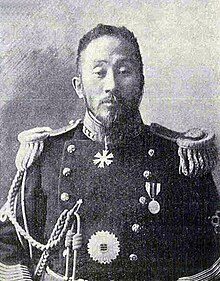Yi Yong-ik
Yi Yong-ik | |
|---|---|
 | |
| Korean Minister of Military | |
| Monarch | Gojong |
| Preceded by | |
| Succeeded by | Yun Ung-nyeol |
| Minister of Currency | |
| Monarch | Gojong |
| Preceded by | Shim Sang-hun |
| Succeeded by | |
| Personal details | |
| Born | 1854 Hamgyong Province, Kingdom of Joseon |
| Died | 1907 (aged 52-53) Russian Empire |
| Profession | Official |
| Military service | |
| Allegiance | |
| Branch/service | |
| Rank | Lieutenant General |
Yi Yong-ik (6 January 1854 - 1907 Korean: 이용익) was an official, and politician of the Korean Empire. As an official, Yi was very interested in education. He established Bosung College, which later becomes Korea University.[1] As an officer he was also a lieutenant general of the Imperial Korean Army.
Life[]
On 6 January 1854, Yi was born in Hamgyong Province, which is nowadays part of North Korea.[2] His father, Yi Hak-shin was an official too.[3] His family was a poor peasant family. Almost nothing is acknowledged about his family. He was not able to get a good education but he learned Chinese Characters from school.[4] Yi became friends with . In 1882, during Imo Incident he used his fast walk to contact with Empress Myeongseong. Gojong appointed him as Busa of Tanchon. Yi had an ability to find where the golds are located. These golds found from Tanchon helped developing the country a lot.[4]
For these accomplishments, Yi became a high ranked financial officer of the Royal family. But in 1888, Yi was indict for the rebellion in his land, Bukcheong. Yi got his wealth from people by making them pay too much tax.[5] For this, he was exiled to what is now South Jeolla Province.[6] After two months of exile, he was forgiven and brought back.[7]
Yi started to play a big role in politics after he was appointed as the Nae Jang Won which is part of Gungnaebu in 1897. In 1899, as Minister of National Defense, he participated in establishment of Daehan Cheonil Bank. In 1902, he became the minister of currency. As the minister, Yi leaded the reform of currency as part of Gabo Reform. He prevented the foreigners mining golds to strengthen the Imperial family.[4] He ordered a lot of coins to be made which Independence Club denounced.[2] In 1903, Yi became the supreme commander of the military police and appointed as Major General of the Imperial Korean Army.[8] Before the Russo-Japanese War happened, YI always prepared for war by preparing various equipments.[9] In 1904, when the Japan–Korea Treaty of 1904 was signed, Yi showed his disagreement. Japanese kidnapped Yi for various reasons including his disagreement. Even being kidnapped, Yi learned about new technology and experienced them. He bought a printer, which help the establishments of schools.[10] In May 1905, Yi established the Bosung College by being supported from the country.[11] In May 1905, Yi was appointed as the minister of Military, and Lieutenant General proceeding Min Young-Cheol.[12] As a military minister, Yi got 1st class of Order of the Taegeuk.[13] After Japan–Korea Treaty of 1905 was signed, Yi was sent to France by orders of Gojong. However, he was found in China by Japanese.[2] Han Kyu-seol indicted him of being not present when he was the Minister of Military.[14] As a result, his Order of Taegeuk was taken away.[15] In 1907, he died in Russian Empire by disease.[10] After his death, Gojong was sad of his death and regret about giving heavy punishments to him. Gojong helped Yi's funeral.[16] Yi's final words to Gojong was an advice about concentration to education, and recovering the national sovereignty.[2] Gojong gave Yi posthumous name of Choung Suk (Korean: 충숙, Chinese Character: 忠肅).[17]
Political Tendency[]
As a politician, Yi was always pro-Russian and anti-Japanese. He made Korean Empire to remain neutral during the Russo-Japanese War with Lee Hak-gyun and some other pro-Russian politicians.[2]
Trivial[]
- Yi was a very fast walker. He was able to walk about 200 km within 12 hours.[18]
- Yi had about 1,000,000 Won of deposit in his bank account but, what he gave to his son, Yi Jong-ho, was only 330,000 Won. Japanese interrupted his son to get 1,000,000 Won from his account. Also, Japanese interrupted his son getting 330,000 Won from his account. As a result, his son sued the Japanese bank. But, Yi died in 1932. This money is not returned to Yi's descendants until now.[19]
Resources[]
- ^ ""고려대 설립자는 김성수 아닌 이용익"". 고대신문 (in Korean). 2005-03-22. Retrieved 2022-01-29.
- ^ a b c d e "이용익(李容翊) - 한국민족문화대백과사전". encykorea.aks.ac.kr. Retrieved 2022-01-29.
- ^ "한국역대인물 종합정보 시스템 - 한국학중앙연구원 [이학신(李學新) 인물 정보]". people.aks.ac.kr. Retrieved 2022-01-29.
- ^ a b c "이용익". terms.naver.com (in Korean). Retrieved 2022-01-29.
- ^ "조선왕조실록". sillok.history.go.kr. Retrieved 2022-01-29.
- ^ "조선왕조실록". sillok.history.go.kr. Retrieved 2022-01-29.
- ^ "조선왕조실록". sillok.history.go.kr. Retrieved 2022-01-29.
- ^ "조선왕조실록". sillok.history.go.kr. Retrieved 2022-01-29.
- ^ "우리역사넷". contents.history.go.kr. Retrieved 2022-01-29.
- ^ a b "이용익". terms.naver.com (in Korean). Retrieved 2022-01-29.
- ^ "우리역사넷". contents.history.go.kr. Retrieved 2022-01-29.
- ^ "조선왕조실록". sillok.history.go.kr. Retrieved 2022-01-29.
- ^ "조선왕조실록". sillok.history.go.kr. Retrieved 2022-01-29.
- ^ "조선왕조실록". sillok.history.go.kr. Retrieved 2022-01-29.
- ^ "조선왕조실록". sillok.history.go.kr. Retrieved 2022-01-29.
- ^ "조선왕조실록". sillok.history.go.kr. Retrieved 2022-01-29.
- ^ "조선왕조실록". sillok.history.go.kr. Retrieved 2022-01-29.
- ^ "[유창영의 역사산책] 조선시대 마라토너 :: 대전일보 모바일". 대전일보 (in Korean). Retrieved 2022-01-29.
- ^ "이용익의 예금 33만원은 어디로 사라진 것일까?". TV리포트. 2011-05-22. Retrieved 2022-01-29.
- 1854 births
- 1907 deaths
- Lieutenant generals of Korean Empire
- 19th-century Korean people
- Officials of the Korean Empire
- Imperial Korean military personnel